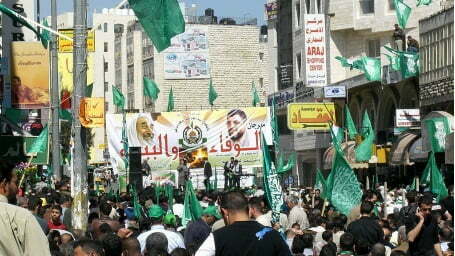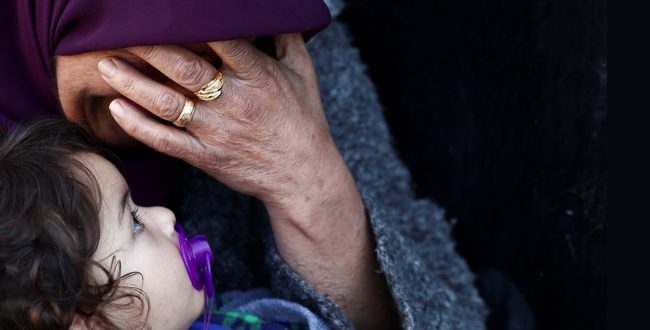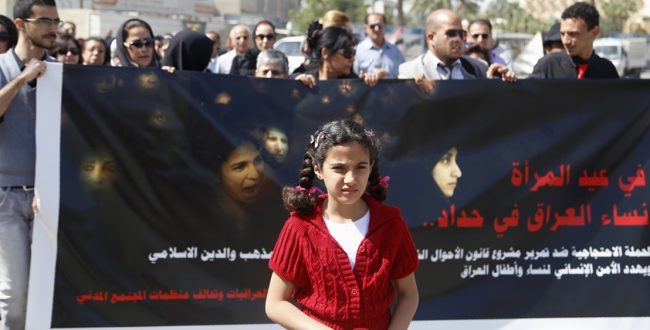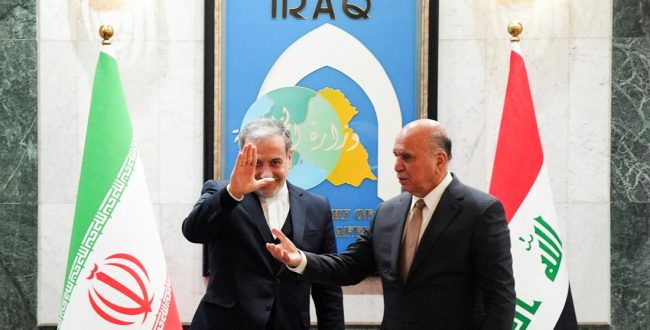The Islamic Resistance Movement – Hamas – was founded in 1987 in light of the beginning of the process of normalization between Israel and the PLO under Yasser Arafat.'Ve paragraph 2 of its founding charter, Hamas defines itself as the Palestinian branch of the Muslim Brotherhood, and in the same breath – movement "unique Palestinian ".
This second, that is, loyalty to a supranational ideological movement, on the one hand, and the perception that it is a national liberation movement, on the other, accompanies the movement to this day. Unlike the PLO, which since the 1980s has seen dialogue with moderate Israeli elements, and later official negotiations with the Israeli government, as an essential means of achieving Palestinian national goals, Hamas has advocated only armed struggle and has been thwarting the Oslo Accords since their signing in September 1993.
Hamas (and with it the other Palestinian armed organizations) cut short its first political achievement with Israel's unilateral withdrawal from the Gaza Strip in the summer of 2005. Following the disengagement, the movement's leadership was able to convince the Palestinian public that it had "liberated" at most 40 % Of West Bank Areas (Areas A and B) – The armed struggle succeeded in persuading one of Israel's most hawkish prime ministers, Ariel Sharon, to withdraw one casualty from the entire Gaza Strip and evacuate 8,600 settlers.
Hamas' second significant achievement was recorded in October 2011, with the completion of the Shalit deal. Thanks to the abduction of Israeli soldier Gilad Shalit from the Gaza border in June 2006 and his detention in Gaza for about five and a half years, Hamas was able to realize a brilliant prisoner exchange deal for it. The deal released 1,027 security prisoners, including hundreds of prisoners sentenced to life in prison for murdering Israelis. Several prominent figures in the movement's leadership today, such as Yahya Sanwar and Hossam Badran, have been released in this deal.
Islamic Spring
The wave of protests in the Arab world, which began in Tunisia in December 2010 and was dubbed the "Arab Spring," had a profound effect on Hamas. Demonstrations in the Arab world have given voice to popular movements – led by the Muslim Brotherhood – movements that have been silenced in many countries by authoritarian regimes. The Hamas political leadership, which sat in Damascus with the outbreak of demonstrations in southern Syria in March 2011, was soon forced to take a stand against the Assad regime, which has sponsored militant Palestinian organizations, including Hamas, since the 1970s. The violent repression of the protest in Syria, led by the country's Muslim-Sunni majority, led Hamas Politburo chief Khaled Mashaal to decide to leave Syria in January 2012 and displace Qatar. The abandonment of the Syrian patron also led to a rift with Iran , which provided weapons and financial support to Hamas.
Hamas soon received the compensation for renouncing the Syrian-Iranian "axis of resistance" in the successive regime changes in the Arab Spring. The overthrow of President Zine al-'Abadin bin Ali in Tunisia led in October 2011 to a general election and a landslide victory for the al-Nahda party led by Rashid Ganushi, who is affiliated with the Muslim Brotherhood. In Egypt, the resignation of President Hosni Mubarak in February 2011 (after 16 months of military rule) led to a general election won by the Muslim Brotherhood. In June 2012, Muhammad Morsi was elected President of Egypt in the country’s first ever free elections. In the general elections held in Morocco in November 2011, the Islamic Justice and Development Party won the majority of votes, and the head of the party, 'Abd al-Ella in Nakhran, headed a coalition of three parties. In post-Gaddafi Libya, the Justice and Development Party, founded at the beginning of the revolution, won second place in the elections.
Hamas leaders, who until the Arab Spring were identified with the Syrian-Iranian axis of resistance, were now guests of honor in Cairo, Tunisia and Khartoum. Hamas, which won a large majority in the democratic elections held in the Palestinian territories in early 2006, saw itself as the harbinger of the Islamic change of government that would take place later in Arab countries. However, as the head of the Politburo , Khaled Mashaal, said in a speech in 2016 , Hamas also had anti-Islamic resistance ("turning against" as he put it) as the other new Islamist regimes did after their victory.
The most important change of government following the Islamic wave took place in Egypt. On June 30, 2013, demonstrations broke out across Egypt demanding that President Muhammad Morsi resign following a series of controversial constitutional changes he sought to pass. The military gave Morsi a 48-hour ultimatum before implementing its own "road map" for Egypt. Two days later, Morsi was ousted by a coalition that included the military, the secular opposition to his regime and the Coptic Church. In Tunisia, the liberal and secular Nidaa Tunis party, backed by trade unions, defeated the Islamist a-Nahda party in late 2014. Al-Baji Qaid al-Sabsi, who served as foreign minister in the Ben Ali government in the 1980s, became Tunisia's first president-elect. Direct.
The Arab Spring thus showed Hamas that the Muslim Brotherhood movement was capable of controlling Arab countries, while "counter-coups" signaled to it that Islamic governments had to face real opposition from home and abroad, and with substantive, objective challenges that did not depend solely on other players. Whether it was the Islamists' behavior in power (comparative behavior in Egypt and inclusive behavior in Tunisia), or the army, which along with the "depth state" mechanisms sought to preserve its power, the Islamist experiment in Arab countries was short-lived.
The new Arab regimes have used the revulsion of the public from extreme Islamic affiliated with Daa"s and identified political Islam represented by the Muslim Brotherhood with jihadist nihilism. In an interview with Kuwaiti newspaper A-sahd October 2018 President Abd el-Fatah promised A-sisi that as long as the government will not be The Muslim Brotherhood has a role to play in Egypt. "The chaos led by the Muslim Brotherhood has destroyed many Arab countries, such as Yemen and Libya," al-Sisi claimed.
The established Arab press also aligned with the new political trend that compared ISIS to the Muslim Brotherhood. Newspapers that supported and encouraged the Islamist revolution soon turned their skin and warned of the dangers of political Islam. In June 2018, the Egyptian journalist Manir Adiv in an opinion piece in the pan-Arab newspaper Al-Hayat, published in London. Adiv claimed that the Muslim Brotherhood had prepared the ground for public support for the Muslim Brotherhood in northern Sinai, and even assisted in recruiting ISIS operatives. Through anarchy, "he wrote.
The new document of principles
Islamic failure has forced Hamas to reckon, and the movement's self-criticism has been reflected in both public speeches by Hamas leaders and policy measures. In an attempt to maintain normal relations with Arab countries even in the post-Islamic era, the new policy document published by Hamas in May 2017 severed Hamas' historic ties with the Muslim Brotherhood. Contrary to its 1988 Basic Charter, which mentioned Hamas' ties to the Muslim Brotherhood no less than seven times, the new document does not mention the Muslim Brotherhood at all.
"We have learned a lesson from what is happening," Khaled Mash'al openly admitted in a 2016 speech . "Not all of the factors that adversely affect us are objective, some are due to our actions, and we need to learn the lessons." Political Islam, Mash'al continued, adhered to democracy more than its "secular" opponents. The real test, however, is whether supporters of political Islam will continue to rely on the ballots for political decisions even in difficult situations where they "see a policy of marginalization and non-recognition of their legitimacy," and conversely, "will they continue to strive for partnership and agreement even when [Islamists] are in the majority?" The challenge. "
The publication of the document of principles was accompanied by a media campaign designed to present Hamas as a national liberation movement and to distance itself from the anti-Semitic and Islamist language that characterized its basic document. "Look at the document on which we were elected to rule in 2006 if you really want to understand Hamas' political vision, not in a treaty written a few decades ago and long forgotten," the movement's senior Ahmed Yusuf wrote in an opinion piece in the British Guardian newspaper. He said Hamas' willingness to relinquish its absolute rule in 2014 and join a Palestinian unity government was indicative of the movement's pragmatism. "Judge Hamas on the basis of the steps it is taking for the benefit of its people. Do not rely on words in the document – the convention – that were written under completely different conditions." In another article, Yosef argued that Hamas should approach the Jews of the world and try to convince them of the righteousness of its path.
This pragmatism is also reflected in the words of Hassan Yussef, a senior Hamas figure in the West Bank. In an interview with these writers in July 2015, a day before the murder of the Duabsha family in the village of Duma by Jewish extremists, Yosef said that if Israel withdrew to the 1967 lines and recognized Jerusalem as the capital of the Palestinian state, Hamas and other Palestinian resistance organizations would lay down their arms. "In Islam, jihad is not an end but a means to an end," Yosef told me. "If the occupation improves its behavior toward our people and recognizes our rights, no Palestinian will want to see another drop of blood."
Simultaneously with the publication of the new document of principles, Hamas began waging a bitter war against jihadist Islamic elements inside the Gaza Strip. Hamas did so both out of a desire to distance itself from the radical Islam with which the Egyptian army was fighting in northern Sinai, and out of a desire to maintain its control within the Gaza Strip. In July 2015, Sheikh Azzam Saleh, a Salafi leader in Gaza, called on Hamas to end the wave of arrests against members of its movement and return confiscated weapons. In 2017, Salafi movements in Gaza admitted launching rockets at Israel as a revenge measure against Hamas following the arrest of their operatives. The attempted assassination of the head of the security apparatus in the Gaza Strip, Major General Tawfiq Abu Naim, in October 2017 was also attributed in Israel to jihadist movements in the Gaza Strip. ISIS in northern Sinai has explicitly threatened to harm the Hamas leadership, and has even broadcast the execution of Hamas operative Musa Abu al-Zamat.
The regional isolation that Hamas has encountered, along with the severe economic damage suffered by the organization following the Israeli closure and the destruction of the smuggling tunnels by the Egyptian army, also contributed to the pragmatic approach adopted by the movement. In an interview with the Palestinian newspaper Al-Quds in May 2017, the head of the Hamas political bureau, Musa Abu Marzuk, explained that the new document is an expression of internal unification in the shadow of the decline of the Palestinian issue in the Arab Spring:
We are experiencing a difficult and unusual regional situation, and an international onslaught on the Palestinian issue. Our environment has given up on the central issue of our people, which requires us to resist attempts to eliminate the "issue". The Palestinian people – and behind it the Arab and Islamic nation – are able to revive the Palestinian issue and force the occupation to surrender to its just demands. The movement document came out to emphasize [Hamas] national responsibility as an Islamic-inspired national liberation movement, and to present a political vision that would anchor national cooperation. There is no future for the national project in a situation of Palestinian division and division.
In an interview with the BBC following the publication of the document of Hamas 'principles, then-Central Bureau chief Khaled Mashaal claimed that Hamas' agreement, in Article 20 of the new document, to recognize a Palestinian state within the borders of June 4, 1967 and its capital Jerusalem is a "joint program with our partners in the Palestinian arena." He said that this compromise on the part of Hamas would help unite the Palestinian arena, that the new document expresses "the development of Hamas' political thinking over the past 30 years, especially in the last decade," and that the goal of internal Palestinian agreement is to address the region and international actors unanimously.
Mashaal went on to claim that Hamas "is moderate, represents the middle way and has a political platform. We address the world in open political language." He said the language in which Hamas's founding treaty was formulated was "liberated," while the new document made a new choice of words. He stressed that while Hamas' ideology is based on that of the Muslim Brotherhood, Hamas is an "independent national liberation movement." In fact, this approach is not new in the leadership of the movement. In an interview with the Muslim Brotherhood in Jordan in 2010, Khaled Mashaal stressed to his home audience that the armed struggle is a means and not an end, and explicitly refrained from declaring that by the long-awaited "liberation" of territories he meant all Mandate territories, from Jordan to the Mediterranean.
In an interview with these writers, Hamas Politburo member Hussein Badran acknowledged that the desperate economic situation in the Gaza Strip, including 50% unemployment, also contributed to Hamas' political resilience. Badran, a former head of Hamas' military wing in northern Samaria and today responsible for linking his movement with the other Palestinian factions, likened his party's position to that of Israel's ideological right: both sides are demanding the entire country, but are willing to acknowledge reality and compromise less.
Summary
The Arab Spring has thrown the Palestinian arena into a political turmoil it is still facing. The rise of political Islam for a short period of time instilled in Hamas hope for finding new strategic partnerships. But the short-lived "Islamic Spring" also hinted that what it was was: President Morsi's regime in Egypt continued to defend the peace treaty with Israel and fought jihadist Islam in northern Sinai, and religious regimes in Morocco and Tunisia continued to treat Jewish communities in the country positively. With Western countries.
The change of these regimes left Hamas almost alone in the Arab arena, and the Qatari principality is its only ally. The destruction of the smuggling tunnels from Egypt and the economic and political siege imposed by Israel on the Gaza Strip also contributed to the flexibility of Hamas' militant line and a desperate attempt to find pragmatic solutions, along with a failure to renounce the stated basic principles. Hamas 'updated position is intended to soften the international community's attitude toward it in light of the three demands made by the international quartet for the peace process (the United States, Russia, the European Union and the United Nations) following Hamas' victory in the 2006 elections: recognition of Israel, recognition of international agreements Nationalism and the neglect of the armed struggle.
For the time being, the international community continues to boycott Hamas as long as it does not recognize Israel and the agreements signed with it. Hamas shares were at a low point, as they were PLO shares following the first Gulf War. Then, in the early 1990s, Israel knew how to take advantage of the PLO's weakness and bring it to the negotiating table in Oslo. Even now, Israel must seriously consider whether it is not time to buy Hamas shares at a low price.


















